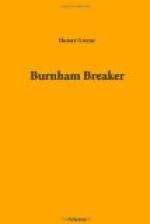Goodlaw saw the struggle and rose from his chair.
“It’s a dangerous imprisonment,” he said, “but not, of necessity, a fatal one.”
She still stood staring silently at the messenger who had brought to her these dreadful tidings.
“They’re a-thryin’ to get to the mouth o’ the shaft now,” said Andy. “They’re a-dhraggin’ the timbers away; timbers wid the fire in ’em yit. Ye’d be shtartled to see ’em, mum.”
Then the lady spoke.
“I will go to the shaft,” she said. Her carriage was already at the door; she started toward it, throwing a light wrap across her arm as she went.
Again the man on the bed moved and moaned.
“Stay with him,” she said to Andy, “until I come myself, or send some one to relieve you. See that he has everything he needs. He is my charge.”
Goodlaw helped her to the carriage.
“Will you come with me?” she asked.
He seated himself beside her and they were driven away. There was little that he could say to comfort and assure her. The shock was too recent. The situation of her son was too perilous.
Darkness was coming on when they reached the scene of the disaster; one or two stars were already out, and the crescent of the new moon was hanging in the west. Great clouds of white smoke were floating away to the east, and where the breaker had that morning stood there was now only a mass of charred and glowing ruins.
There were many people there, people who talked in low tones and who looked on with solemn faces. But there were no outcries nor lamentations; there was but one person, a boy, shut up in the mine, and he was kin to no one there.
Up at the south-west corner of the pile they were throwing water on the ruins. An engine had been brought up from the city and was pouring a steady stream on the spot where the shaft was thought to be.
Many men were engaged in cutting and pulling away the burned timbers, handling them while they were yet glowing with fire, so eager were they to forward the work of rescue.
The superintendent of the mines was there, directing, encouraging, and giving a helping hand. He saw Mrs. Burnham and came up to her carriage.
“It was a very disastrous lightning stroke,” he said; “the property of the company is in ruins, but as yet no lives have been lost. There is but one person in the mine, the boy Ralph; you both know him. We are clearing away the wreckage from the mouth of the shaft as rapidly as possible, in the hope that we may get down there in time to save his life. Our people have directed me to spare no effort in this matter. One life, even though it is that of an unknown boy, is not too poor a thing for us to try, by every possible means, to save.”
“That boy,” said Goodlaw, “is Mrs. Burnham’s son.”
“Is it possible! Has he been identified, then, since the trial?”
“Fully, fully! My dear sir, I beg that you will do all that lies in your power to save this life for your company’s sake, then double your effort for this lady’s sake. She has no such fortune as this boy is to her.”




